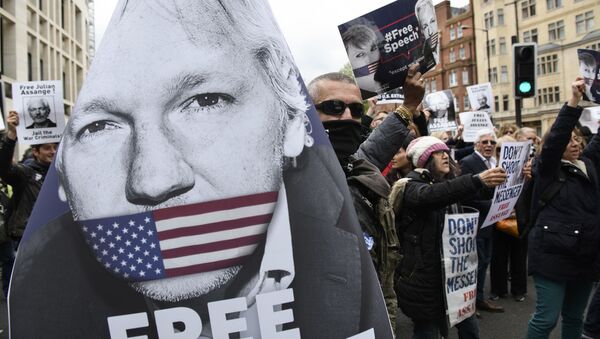Geoffrey Robertson, a long-time adviser to WikiLeaks founder Julian Assange, has claimed that Pentagon hawks are the ones who went after the famous whistle-blower.
Robertson, who unsuccessfully defended Assange in a 2010 extradition case, made the claim in a radio interview with Australia’s ABC.
When asked what the worst-case scenario for Assange would be, he replied: “He dies in an American supermax. That is what is intended by the current regime.”
He said he spoke to US officials after he learned that a US federal grand jury had secretly met in 2010 to consider possible criminal charges against Assange.
“I had a few high connections with the Obama administration and I said to them: ‘They really want him because there are dangerous precedents here for the New York Times and for newspapers around the world.’”
However, he continued, Obama officials told him they had nothing to do with the Assange case: “We don’t want him, but the Pentagon does, and the Pentagon may eventually get its way.”
Julian Assange, 47, is currently serving a 50-week jail term a UK court slapped him with for breaching bail conditions in Britain in 2012.
The UK home secretary signed an extradition request submitted by the US, and hearings on whether Assange should be handed over to the United States are set to begin next February.
Assange Indictment
A US federal grand jury has indicted the Australian-born whistle-blower on 18 charges, including 17 counts of espionage and a single count of hacking into a Pentagon computer network, which carry a cumulative prison sentence of 180 years.
The Justice Department accused Assange of aiding and abetting Chelsea Manning, a former US army intelligence analyst, in gaining unauthorised access to classified national security information.
“Assange’s actions risked serious harm to United States national security to the benefit of our adversaries,” the justice department said in a statement.
WikiLeaks called the charges “the evil of lawlessness in its purest form”.
This refers to tens of thousands of documents relating to US-led wars in Iraq and Afghanistan, diplomatic cables, and Guantanamo Bay detainee assessment briefs. Specifically, WikiLeaks disclosed a never-seen-before video purportedly showing US soldiers killing a dozen people in Baghdad in 2007, including two Reuters staffers, and wounding two children.
Manning was arrested in 2010 and sentenced to 35 years in 2013, but had her sentence commuted by Barack Obama in 2017. However, she was jailed again in March for refusing to testify to a grand jury investigating the WikiLeaks case.
Crackdown on Press Freedom?
Geoffrey Robertson had doubts that Donald Trump would grant clemency to Assange the way Obama did with Manning.
He said the Trump administration intends to argue that the First Amendment, which protects the US press and publishers, does not apply to Assange since he is an Australian citizen.
Robertson believes that this would set a dangerous precedent for American newspapers, because many of their contributors are non-Americans and thus could fall out of the scope of the First Amendment.
This echoes the concerns of WikiLeaks editor-in-chief Kristinn Hrafnsson, who said in May: “With the indictment, the ‘leader of the free world’ dismisses the First Amendment − hailed as a model of press freedom around the world − and launches a blatant extraterritorial assault outside its border, attacking basic principles of democracy in Europe and the rest of the world.”
Assange was forced out of Ecuador’s embassy in London, where he has been holed up for seven years, after the country revoked his citizenship and let UK police arrest him right in the embassy building.
His relations with Ecuador began to deteriorate since the country’s socialist president Rafael Correa was replaced in 2017 by Lenin Moreno, who sought to build closer ties with the United States.
Assange sought asylum in the embassy in 2012, when Swedish prosecutors wanted him on sexual assault charges, which he called politically motivated.
He feared that if he were extradited to Sweden, he could end up in the hands of US prosecutors, who could try him on espionage charges.
Seven years later, the fears still linger.




